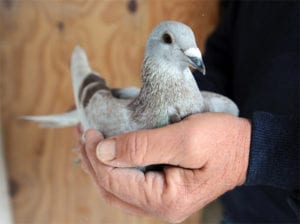Pet Bird Transmitted Diseases. It may be hard to believe, but your pet bird can make you sick. There are several diseases that birds can transmit to people (these are called zoonotic diseases). For your own health, it is important to understand how to prevent transmission of these diseases.
Simple hygiene can prevent most of the diseases that birds and humans share. If you are conscientious about cleaning up after your bird and always wash your hands after handling your bird or his bowl and toys, it’s very unlikely that you will become ill. Of course, not every bird harbors such infections, but it’s always best to be safe.
Who’s at Risk

Pigeon in New York City (file / credit: STAN HONDA/AFP/Getty Images)
The risk of getting a disease from your bird is typically highest in people who already have chronic diseases, such as the very young, the elderly, HIV-infected individuals, organ-transplant recipients, and people receiving chemotherapy. People at risk should speak with both their physician and their veterinarian about the relative risks of disease transmitted from pet birds.
The following conditions are some of the more common infections carried by birds:
- Chlamydiosis – Also known as Psittacosis, can be transmitted to humans. In people, the disease causes flu-like symptoms of fever, chills and headache. If left untreated, Psittacosis can cause liver and kidney damage or even meningitis. Note: This Chlamydia is not the same infectious agent that spreads among humans as a sexually transmitted disease.
- Chlamydia infection transmits through feces and infectious particles in the air. Treatment for the infection includes an antibiotic, doxycycline, which doctors and veterinarians use in humans and birds. If you find yourself or other family members coming down with “the flu” and your bird isn’t feeling well, it could be Chlamydia; contact your family doctor and your veterinarian.
In your bird: Psittacosis causes varying severity of illness in birds. Some birds are simply carriers; this is typical in the cockatiel. Other birds may lose their appetite and become emaciated, depressed and may develop difficulty in breathing or diarrhea. Without treatment, most birds die from this disease. Diagnosis requires a panel of tests because no single test can accurately determine whether your bird is infected. You should obtain these tests as part of a pre-purchase examination, especially if there are clinical signs of Psittacosis. - Avian Tuberculosis – Not often seen in birds, but transmission to people can lead to respiratory infections, swelling of lymph nodes below the jaw and even widespread disease in people with weakened immune systems. The disease can spread through the air or through the feces from infected birds.
In your bird:
Affected birds usually have vague symptoms, such as loss of weight despite a good appetite, dull feather coloring, increase in urine output, diarrhea and anemia. Diagnostic tests aren’t too reliable, but a veterinarian experienced with avian diseases will usually examine the feces for bacteria. Euthanasia of a bird infected with Mycobacteria is necessary due to the potential danger to humans. - Histoplasmosis – A respiratory infection in people who inhale fungal spores from contaminated soil or dust. The Histoplasma fungus grows on bird feces, so it’s a concern in buildings where large amounts of pigeon droppings collect in roosting sites. While this isn’t a big issue in pet birds, it is prudent not to allow fecal matter to accumulate to the point that mold can grow on it.
- Cryptococcus – Another fungal infection. Though uncommon in pet birds, infection can cause diarrhea, paralysis, nervous-system signs and masses with a gelatinous consistency. Humans can contract this disease when they inhale the dust from dried droppings (most commonly from pigeons). Infection in people can be quite serious leading to meningitis, encephalitis (brain inflammation) or respiratory symptoms.
- Allergic Alveolitus – While not truly a zoonotic disease in the sense that it does not affect birds, bird owners can contract Allergic Alveolitus by inhaling particles of bird dander in the air. Allergic Alveolitus also goes by the names of Pigeon Lung Disease and Parakeet Dander Pneumoconiosis.
- Campylobacteriosis – A bacterial infection that causes gastrointestinal problems. It usually transmits through fecal contamination of food and water. While diarrhea, weight loss, and lethargy are common, Campylobacteriosis can also be present in birds that show no symptoms of illness.
Although this list is not inclusive, it does list the more common diseases that can pass to humans keeping pet birds. Good hygiene practices are the best method of prevention!
At Pigeon Patrol, we manufacture and offer a variety of bird deterrents, ranging from Ultra-flex Bird Spikes with UV protection, Bird Netting, 4-S Gel and the best Ultrasonic and audible sound devices on the market today.
Contact us at 1- 877– 4– NO-BIRD, (604) 585-9279 or visit our website at www.pigeonpatrol.ca
Bird Gone, Pigeon Gone, Seagull Gone, Pigeon issue, pigeon spikes, 1-877-4NO-BIRD, 4-S Gel, Bird Control, Pigeon Control, bird repellent, Bird Spikes, sonic bird repellent, stainless steel bird spikes, bird spikes Vancouver, Ultra Sonic Bird Control, Bird Netting, Plastic Bird Spikes, Canada bird spike deterrents, Pigeon Pests, B Gone Pigeon, Pigeon Patrol, pest controller, pest control operator, pest control technician, Pigeon Control Products, humane pigeon spikes, pigeon deterrents, pigeon traps, Pigeon repellents, Sound & Laser Deterrents, wildlife control, raccoon, skunk, squirrel deterrent, De-Fence Spikes, Dragons Den, Canada bird spikes, Canada pigeon, pigeon control, pigeon patrol, pigeon. Kill pigeons, crow, starling
